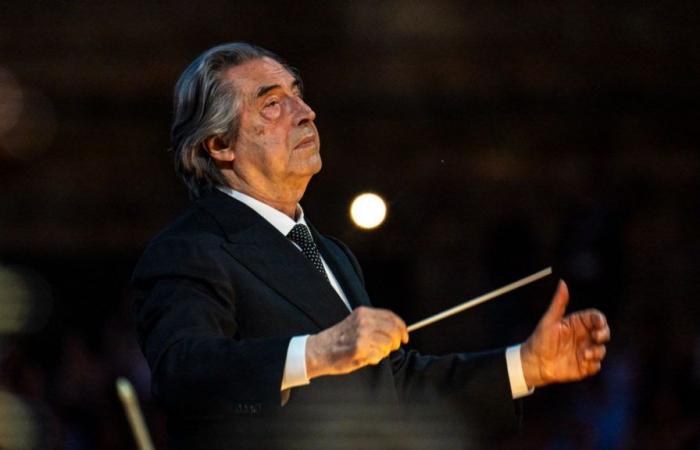To celebrate the centenary of Puccini, the city of Lucca and the Ministry of Culture have decided to aim high: a great concert under the historic walls of the Tuscan city, as if it were any event of its rock summer, entrusted to the direction of Riccardo Muti and broadcast worldwide. Beyond Muti’s undoubted directorial merits, a spontaneous question arises: why him?
In his decades-long career, Muti tackled Puccini only a few times: Tosca in the recording studio with the Philadelphia Orchestra (1993) and at La Scala (2000), e Manon Lescaut again at La Scala (1998) and in Rome (2014), to which we can add some symphonic pieces recorded with the Filarmonica della Scala and performed again in concert. The composer from Lucca was therefore only grazed by Muti, despite the latter having always declared that he loved this music and despite his long association in the symphonic field with composers of the early twentieth century in Italy such as Respighi. The answer to the question can therefore be very simply linked to the appeal that the name of Muti has for the public not only of enthusiasts, and given the occasion of the broadcast of the event by Rai, a name of appeal was needed. In this piece we will leave aside all the surrounding worldliness that an event of this kind involves between ministers, presenters and speeches bordering on sermons, and we will analyze the musical results.
As already mentioned, Riccardo Muti is not a regular visitor to Puccini’s music, but this does not mean that he does not know how to perform it. All his conducting technique emerges forcefully already in the opening piece, the Symphonic Prelude written during his studies at the Milan Conservatory and performed for the first time in 1882. Muti gives this music a wide breadth and cantability but also highlights its Wagnerian ancestry, in a result that is of great romantic inspiration. The great work done with his emerges immediately Luigi Cherubini Youth Orchestrain an unprecedented formation that sees the current elements joined by former members who now play as first parts in large Italian orchestras; this union generates a group with a compact and bright sound, in which each section can be clearly heard and at the same time merges to create an idiomatic and fascinating polish, in a technical level of great quality.
However, the evening is mainly made up of opera arias and duets, starring sopranos and tenors, and a marked absence of baritones (yet there would be no shortage of solo pieces). So we start with Eleonora Buratto who intones “One day we’ll see” from Madama Butterflytaken by Muti with a rather disconcerting speed, which leaves almost no room for theatrical breathing, but in which one notices the utmost attention to the orchestral phrasing which itself becomes a dramatic support for the text intoned by the soprano, up to a closing overshadowed by tragedy with the sound of the cellos forcefully brought to the fore. Buratto manages to keep up with Muti, showing a broad voice and a solid line.
A double tenor classic follows. First Luciano Hooks he confidently intones a “Recondita armonia” in which he does not skimp on finesse of phrasing, while Dmitry Korchak he doesn’t master the high notes of “Che gelida manina” very well. The “Vissi d’arte” sung by Buratto slips away a little without great impressions, while it is more striking Francis Meli in “Ch’ella mi creda” from The Girl of the West: the centralizing texture is well suited to the current vocality of the tenor and, net of an overbearing vibrato in the high notes, leaves a good impression. For his part, Muti sets this aria with dark solemnity, and one naturally wonders what one of his would be like. Girl especially now that he has declared in various interviews that he actually wants to perform it.
Korchak returns to the stage reinvigorated for “O soave fanciulla”, where both he and Mariangela Sicily they indulge in nuances of great musicians. Sicilia then demonstrates all her vocal ability in a “Donde lieta uscì”, a little forced in interpretation but passionate in phrasing and closed with a series of pianissimo of a unique sweetness.
Lydia Friedman faces the “Senza mamma” of Sister Angelica (only concession to Triptych) with its nasal and slightly metallic timbre, certainly fascinating, and vocal material from a great singer (just listen to the end of the song), but which lacks true emotional involvement, despite Muti’s emphasis on the funeral march colours of the song.
In “E lucevan le stelle” the good impressions previously had on Ganci are confirmed, while the only song chosen by Turandot: “Tu che di gel sei cinta” is sung with too much expressiveness by Buratto, but Muti manages to bring out and bring to the fore the exoticism of that lament; each phrase thus becomes a discovery of orchestration and, at the same time, one seems to hear in these last Puccini notes the echo of the Manon Lescaut.
Just theInterlude and the last act of this opera close the concert and it can be said that we are faced with the highest moment of the evening. Muti shows that he has pondered this title and lets himself go much more from an expressive point of view compared to the previous pieces, but also compared to the La Scala edition of 25 years ago. Thus emerges the power of the orchestration of this opera and the modernity of the solutions adopted by Puccini already in 1893: despite its extremely Italian cantability, it is not difficult to hear the entire twentieth century that owes so much to Manon Lescaut, from Berg to Stravinsky to Šostakóvič. In this setting, Fridman and Meli become instruments in the hands of the maestro and tackle the two protagonist roles, here rather insidious, without particular weaknesses, but without leaving great impressions either.
Here, therefore, is the problematic point of Muti’s Puccini: such a protagonist conductor who has never liked sharing success with other stars, especially vocal ones, risks having some problems in handling the music of the Lucchese; many of his protagonists, in fact, from Manon to Turandot, but even Magda della Swallow, they need a touch of stardom and true champions, otherwise they don’t work on stage. He is therefore surprised that the maestro wants to try his hand at a work like Girl of the West in which Minnie has a considerable weight and which, without a truly incisive interpreter, risks becoming a soufflé deflated. In Puccini, in fact, the singers need some margin for maneuver and caging them in large architectural constructions ends up plastering and making the entire musical flow too mechanical, which is sometimes felt on this evening. Muti is in fact a magician of the architecture of sound, but he has never been a profound interpreter: even his Verdi are great frescoes in which everything is well pigeonholed in form, the vocal interpreter does not have great margins, and the rubati are effective they do their duty even after half a century. Unfortunately, in this music it doesn’t work and one often has the idea that this whole technique often ends up arousing infinite admiration but not emotion.
However, the large audience showed that they enjoyed the event, in an atmosphere almost like a pop concert. There is no shortage of applause after the arias, and also during the various speeches by Muti who was “interviewed” three times by Serena Autieri, presenter of the Rai live broadcast. Great party, in short, but perhaps a better tribute would have been paid by staging that one Girl longed for by the master.
PUCCINI ACCORDING TO MUTI
OLuigi Cherubini Youth Orchestra
Director Richard Muti
Sopranos Eleonora Buratto, Mariangela Sicily, Lydia Friedman
Tenor Luciano Ganci, Dmitry Korchak, Francis Meli
Lucca, 28 June 2024
Photo: Francesco Prandoni
Photo: Francesco Prandoni
Photo: Francesco Prandoni






